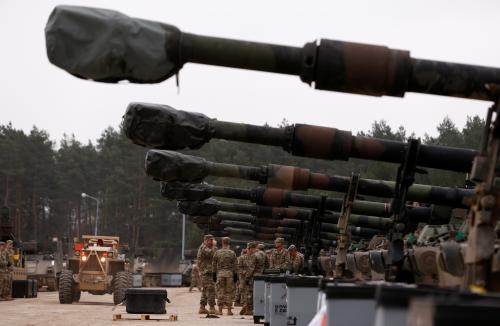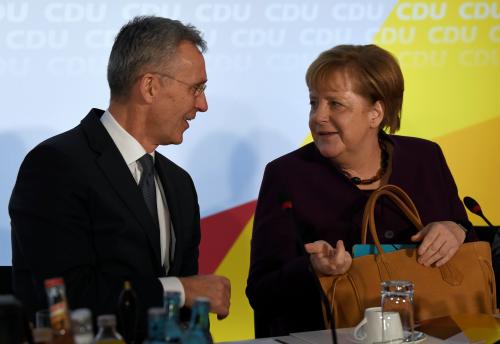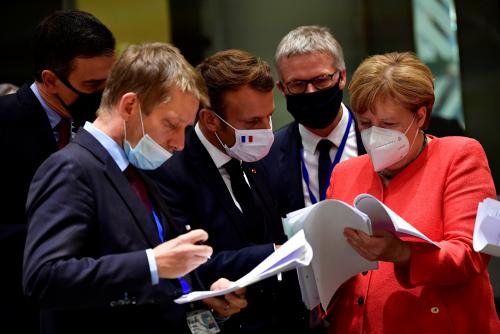James Kirchick argues that Germany’s “pacifistic neutralism undermines the transatlantic relationship just as much as Trump’s America First unilateralism.” The U.S. President’s contempt for traditional alliances, Kirchick writes, has been “a convenient alibi for overlooking serious and important divisions between [the U.S. and Germany…] in favor of simplistic morality tales.” This piece originally appeared in The Washington Post.
President Trump’s decision to withdraw 12,000 U.S. troops from Germany has prompted a surfeit of lamentation from foreign policy elites. Yet most of the commentaries overlook an important factor: the opinion of the German people themselves.
According to a poll released this week, 47 percent of Germans support reducing the number of U.S. soldiers on their territory. One in 4 are happy to say auf Wiedersehen to them all. Only 28 percent believe the figure should stay the same. And a measly four percent wish to see it increased.
Trump has been rather explicit in framing the redeployment as punitive. He doesn’t understand why the United States is “supposed to protect” Germany against Russia while Berlin pays Moscow for gas, and he doesn’t seem to like Chancellor Angela Merkel all that much. But is it really fair to describe something as punishment when the recipients are such gluttons for it?
That a large plurality of Germans want to scale down the U.S. military presence should come as no surprise, as they have been ambivalent about their country’s relationship with ours since the creation of the Federal Republic more than 70 years ago.
When Russian tanks rolled into nearby Hungary in 1956, nearly two-thirds of West Germans believed their country should “remain neutral” between the Soviet Union and the United States. It was not until the Red Menace literally reached their doorstep in the form of the Berlin Wall that a majority favored “good terms with Americans” over “remain[ing] neutral,” a ratio that fluctuates to this day.
In the early 1980s, the Bundestag came perilously close to rejecting the deployment of U.S. nuclear-tipped Pershing missiles. Some of the largest demonstrations in German history remain the 1983 protests against this defensive response to Soviet nuclear blackmail. And since the end of the Cold War, large pluralities have supported either partial or wholesale withdrawals of U.S. troops.
The mainstream media and its friends in the “resistance” have blithely overlooked this history in their shared indignation over this latest example of Trump’s perfidy. Yet this week’s poll results remind us that Germany’s pacifistic neutralism undermines the transatlantic relationship just as much as Trump’s America First unilateralism.
To be sure, Trump’s handling of the withdrawal bears all the hallmarks of his scattershot diplomacy. An important strategic decision undertaken out of spite and personal pique? Check. Blindsided allies and snubbed congressional leaders? Yup. A stubborn refusal to acknowledge basic facts, in this case, the difference between a recommended defense spending target and an imaginary “fee to NATO?” You betcha.
Trump loves to harp on how the United States is “protecting” Europe’s richest country, but U.S. troops are not stationed there to defend miserly and ungrateful Germans. We forwardly deploy our forces in Germany to deter a predatory Russia from upsetting the European security order — something manifestly in our interest — and because it’s closer to hot spots like Africa and the Middle East. In 2012 and 2013, President Barack Obama withdrew substantial numbers of soldiers from Europe — to muted reaction from those now condemning Trump — and Vladimir Putin responded the following year by invading Ukraine and annexing Crimea.
And yet if Trump’s troop withdrawals are a “gift to Putin,” what can be said of Germany? It continues the Nord Stream 2 gas pipeline, decried by a former Polish defense minister in 2006 as akin to the Nazi-Soviet Pact. It opposes arming Ukraine. And the state of its military is one of total “dysfunction.” Not that most Germans see any problem with this. Last year, six out of 10 said their country should not come to the aid of a fellow NATO member threatened by Russia, a repudiation of the core premise of the collective security alliance that Trump and Trump alone is blamed for weakening. And who can fault the Germans, when a similar number believe the United States would do the job for them anyway? Nor is this pacifism limited to Russia: 52 percent of Germans disagree with the statement that it is even sometimes “necessary to use military force to maintain order in the world.”
Finally, when discussing Germany, one should never discount the role played by good old-fashioned anti-Americanism. This is a land, after all, where more than 100,000 people poured into the streets this summer to protest racism in a country thousands of miles away, but in 2018 only saw some 2,000 decry the violent wave of anti-Semitism in its own backyard. I’ll leave it to you to ponder the reasons for this massive disparity in outrage.
Trump’s disdain for traditional alliances may have weakened America’s global leadership. But it has been a boon for a raft of German politicians and American partisans, a convenient alibi for overlooking serious and important divisions between their two countries in favor of simplistic morality tales. Those divisions existed long before Trump descended his golden escalator, and they will persist long after he leaves the White House.
The Brookings Institution is committed to quality, independence, and impact.
We are supported by a diverse array of funders. In line with our values and policies, each Brookings publication represents the sole views of its author(s).









Commentary
You wouldn’t know it from the coverage, but most Germans are fine with Trump’s withdrawal of US troops
August 11, 2020